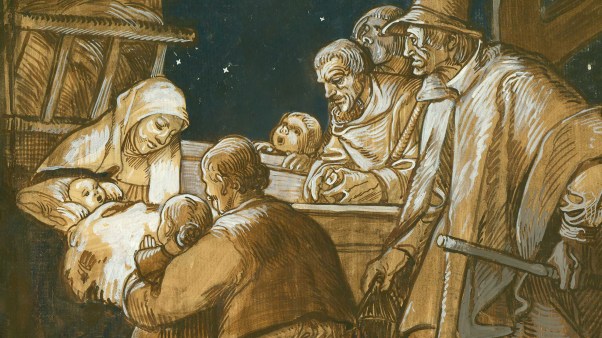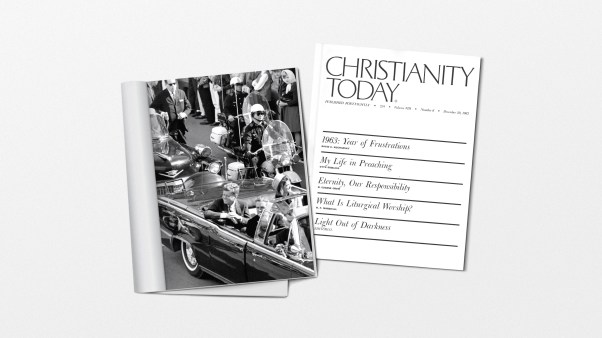Forget what the billboard charts say—to judge from church ads in the Yellow Pages, America’s favorite song is “I’m Mr. Lonely.” Churches are quick to spot that need and promise eagerly that they will be friendly, or be family, or just care. Apparently this is the church’s principal product. When people need tires, they look up a tire store; when they start having those bad-sad-mad feelings, they shop for a church.
Here, for once, denominational and political divisions vanish. Churches across the spectrum compete to display their capacity for caring, though each has its own way of making the pitch. The Tabernacle, a “spirit-filled, multi-cultured church,” pleads, “Come let us love you,” while the Bible Way Temple is more formal, if not downright odd: “A church where no stranger need feel strangely.” (The only response that comes to mind is “Thank thee.”) One church sign in South Carolina announced, “Where Jesus is Lord and everybody is special,” which made it sound like second prize. And one Methodist congregation tries to get it all in: “A Christ-centered church where you can make new friends and form lasting relationships with people who care about you.”
But when Jesus preached, he did not spend a lot of time on “caring.” The first time we see him, in the first Gospel, the first instruction he gives is “Repent” (Mark 1:15). From then on, it’s his most consistent message. Yes, he spoke words of comfort like “Come to me, all who labor and are heavy laden” (Matt. 11:28). But much more frequently he challenged his hearers, urging them to turn to God in humility and admit their sins. Even when told of a tragedy that caused many deaths, he repeated this difficult theme: “Unless you repent, you will all likewise perish” (Luke 13:1-5).
We love one of these sayings of Jesus. We repeat it often, paste it onto felt banners, and print it on refrigerator magnets. We mostly ignore those on repentance. This says more about us than it does about Jesus.
One thing it says is that we live in a time when it’s hard to talk about Christian faith at all, much less about awkward topics like repentance. (No era finds repentance easy, but many have found it easier to talk about.) Paradoxically, we live in a very easy time. We are the wealthiest, healthiest, most comfortable generation in history. With less to struggle for, we become increasingly oriented toward pleasure. This all-too-natural inclination is what most unites us. America is a place of wild diversity, but we all meet at the shopping mall.
Whining Spiritual Babies
We’re confirmed in this expectation by a ceaseless stream of advertising messages. These messages tell us who we are: special, precious people with no faults, who deserve to feel better than we do. Ads tell us, “Your wife (boss, teenager, classmate) doesn’t understand you, but we do. Here, buy this, and you’ll feel better.” Advertising invites us to be big babies—an invitation that fallen human nature has always found hard to resist.
Try telling a person who’s been discipled by advertising that he’s a sinner. A hundred years ago, a preacher would have seen heads nod in recognition at that familiar concept. But today’s consumer is likely to be shocked—and baffled. How could he be a sinner? All he knows is that he’s unhappy because he does not have his fair share of stuff, and he isn’t appreciated enough by those around him. Original sin? He will readily agree that everyone else keeps letting him down. That he’s estranged from the one, holy God and needs to be reconciled? He’s likely to respond, “So who’s this God who thinks he’s better than us?” Bring up Judgment Day, and you’ll get to see someone genuinely appalled; the very idea just sounds so judgmental.
In trying to reach this seeker, the church has been given a severely reduced pack of options. Since he is aware only of seeking comfort, it looks like that’s what we have to headline in any message we send. Neither this need, nor our response, is untrue. A profound sense of unease and dislocation is indeed part of the human condition, because sin has estranged us from God. “I’m Mr. Lonely” is the theme song of everyone on Earth. The church has the only authentic solution to this problem, because we bear the Good News of reconciliation through Jesus Christ.
The problem comes when we never get around to talking about the hard part of the Good News. The problem can even be that we start forgetting it ourselves, and start believing that consolation is the main reason Jesus came. But what’s wrong with us required much more than a hug; it required the Cross. It doesn’t seem this way; we too, have been catechized by the world and reflexively think of ourselves as needy, wronged children. We’d rather feel as if we’re victims of a cruel world than admit we are contributors to the world’s cruelty, lost sinners who perversely love our lostness, clinging to our treasured sins like a drowning man to an anvil.
How bizarre such language seems today. We look around our neighborhood and our congregation and everyone seems so nice. We know what really wicked people are like—we see them in the papers every day—and we’re not like that. God must find us, in comparison, quite endearing. And of course he knows the hurts we bear deep inside, and anyone who’s been hurt can’t be bad (I call this the “victims are sinless” fallacy). With these and a thousand other sweet murmurs we shield ourselves from our real condition and remain Christian babies all our lives: pampered, ineffective, whiney, and numb.
Repentance Is Joy
Jesus didn’t come to save us just from the penalty for our sins; he came to save us from our sins—now, today, if we will only respond to the challenge and let him. A nation of grownup Christians, courageous, confident, humble, and holy, would be more compelling than any smiley-face ad campaign. The Lord does not love us for our good parts and pass over the rest. He died for the bad parts and will not rest until they are put right. We must stop thinking of God as infinitely indulgent. We must begin to grapple with the scary and exhilarating truth that he is infinitely holy, and that he wants the same for us.
I propose that we recover the ideas of sin and repentance, and reinstate them at the heart of all we do. Such words make us uncomfortable, and raise images that come more from old movies than Scripture. “Repent!” is what’s on the soundtrack when a sweating, shouting preacher in a string tie starts slamming his Bible around and making everybody cower. But the meaning of repentance in Scripture and the early church was very different. It was part of the good news, so any bad-news associations we find lying around are just plain wrong.
A good place to start is with the word repentance, or the Greek metanoia, meaning a change of mind. (The Hebrew word is shub, which means to change from the wrong to the right path.) Metanoia is a compound word; “meta” is a versatile preposition that here denotes transformation. Metamorphosis is a change of shape; metanoia is a change of the “nous,” or the innermost consciousness, a region that lies below both rational thought and emotion. “Be transformed by the renewal of your mind [nous],” Paul wrote, and the devotional classic “The Shepherd” (a.d. 140) says, “Repentance is great understanding.” Repentance is not blubbering and self-loathing. It is insight.
The insight is about our true condition. We begin to see our fallen inclinations the way God does, and realize how deep-rooted is the rottenness in our hearts. This awareness grows slowly, over many years, because he mercifully shows us only a little at a time. But he sees it all. His is like the eye of a surgeon, which sees through to the sickness deepest within. There is no other way for us to be healed. It’s when the surgeon says, “All we can do is keep him comfortable,” that you’re really in trouble.
Some will object, “But I don’t think I’m a fine person. I already hate myself, I feel ashamed and like a failure all the time.” That miserable feeling can be pride with a twist: we have an unreasonably inflated idea of how wonderful we can be, and find the inevitable failures crushing. God’s assessment of our abilities is more accurate to begin with, so he doesn’t share our surprised dismay. Repentance, “great understanding,” replaces our distorted self-image with God’s perspective.
Other times the wash of self-hatred is due to feelings of hopelessness. We all have committed a million wrongs, large and small. We can get stuck there, aware that God forgives us but unable to apply that fact, and aware that we’re bound to continue to fail. It seems like there’s no solution, so we sit in the garbage pile feeling miserable.
This is not repentance; this is despair. The early church differentiated between the two, perceiving that healthy repentance is vigorous and clear-minded, while despair is debilitating, and in fact sinful. Isaiah, a fifth-century Egyptian monk, warned against the kind of sadness that “sets off numerous diabolical mechanisms until your strength is sapped. The sadness according to God, on the other hand, is joy … It says to the soul, ‘Do not be afraid! Up! Return!’ God knows that man is weak, and strengthens him.”
“Sadness according to God,” repentance, is joy. Initially we fear looking squarely at our sins, lest we get overwhelmed. But the reverse turns out to be true. The more we see the depth of our sin, the more we realize the height of God’s love. The constant companion of repentance is gratitude. Like the woman who washed Jesus’ feet with her tears, we are forgiven much and discover endless love. Seeing our sin becomes, paradoxically, an opportunity for joy.
Then we are free indeed: free from any need to hide, to conceal or impress, to make excuses for ourselves, to demand our fair share. Free to love God with abandon, free to love others without bargaining and conditions. Free to love even those who hurt us because, ultimately, nothing can hurt us. Knowing our own sin, we pray for all other sinners, asking God to show them the mercy he has given so abundantly to us.
A gospel of comfort, on the other hand, is a gospel of minimal expectations. Christianity is one of the great world religions, and the greatest spiritual power in history. But we don’t act like it. We act like once people are in the door and make a statement of faith, the whole thing is over. Paul envisioned something more like a transformation, Christ living in us and we in him.
A story is told about a desert monk of the early church, Abba Joseph. A young monk came to him and said, “As far as I can I say my prayers, I fast a little, try to live in peace and keep my thoughts pure. What else can I do?”
Abba Joseph stood up and spread out his hands toward heaven, and each of his fingertips was lit with flame. He said to the young monk, “If you want to, you can be totally fire.” The challenge is ours as well: What, really, do we want?
Frederica Mathewes-Green is author of The Illumined Heart (Paraclete).
Copyright © 2002 Christianity Today. Click for reprint information.
Related Elsewhere
A ready-to-download Bible Study on this article is available at ChristianBibleStudies.com. These unique Bible studies use articles from current issues of Christianity Today to prompt thought-provoking discussions in adult Sunday school classes or small groups.
Also appearing on our site today:
A Daily Repentance WorkoutAs we grow in knowledge of ourselves, Gods grace allows us to resist habitual sin and grow in self-control.
Visit the authors Web site at www.frederica.com
See Frederica Mathewes-Greens post-9/11 article, Judgment DayGod promised that calamity would follow disobedience. So why are we quick to dismiss it as a reason for the September 11 attacks?
The Paraclete Press site has an excerpt of Mathewes-Greens The Illumined Heart. The book is available at Christianbook.com.
Mathewes-Green is a regular columnist on Beliefnet.
Frederica Mathewes-Green, former columnist for Christianity Today, wrote her final column for the magazine in October. Her columns included:
Unrighteous Indignation (Oct. 5, 2000)
A Clear and Present Identity (Sept. 5, 2000)
Every Day Is Casual Friday (July 18, 2000)
Get It? (May 18, 2000)
Sex and Saints (Apr. 11, 2000)
Psalm 23 and All That (Feb. 15, 2000)
The Abortion Debate Is Over (Dec. 28, 1999)
The Thrill of Naughtiness, (September 6, 1999)
Escape from Fantasy Island, (July 12, 1999)
Men Need Church, Too, (May 24, 1999)
My Spice Girl Moment, (January 11, 1999)
Moms in the Crossfire, (October 26, 1998)
Gagging on Shiny, Happy People, (September 7, 1998)
Whatever Happened to Middle-Class Hypocrisy? (July 13, 1998)
I Didn’t Mean to be Rude, (May 18, 1998)










